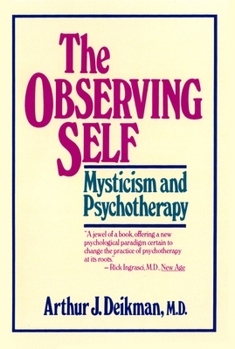The Observing Self
Select Format
Select Condition 
Book Overview
In The Observing Self, noted psychiatrist Arthur J. Deikman lucidly relates how the mystical tradition can enable Western psychology to come to terms with the essential problems of meaning, self, and... This description may be from another edition of this product.
Format:Paperback
Language:English
ISBN:0807029513
ISBN13:9780807029510
Release Date:April 1983
Publisher:Beacon Press
Length:208 Pages
Weight:0.54 lbs.
Dimensions:0.5" x 5.3" x 8.8"
Customer Reviews
4 ratings
The common element in psychotherapy and meditation
Published by Thriftbooks.com User , 17 years ago
This book should be required reading for all students of clinical psychology. When I first came across it I bought two copies just in case something happened to the first copy. Students spend the first few years in psychology courses lost in all the different theories and therapies, lost in the forest of trees, and some never get the whole picture,ie,the communality that runs through them all. And the reason for meditation practices being what they are is seldom explained even by meditation masters. Deikman integrates psychotherapy and meditation. He basically splits a person in two: the one doing the experiencing and the one doing the observing. Normally we are too identified with our thinking and feeling, but we are not these because they can be observed. Psychotherapy is stepping back and looking at that tight identification. Meditation carrys the process to the extreme,not for "life facilitation" as in psychotherapy but for purifying the self. In Buddhist Vipassana meditation, you observe your body and mental processes(once you have enough concentration to observe)because,again, you are not what you can observe. That observing is awareness. Deikman spells this all out in his masterpiece. It's too bad this is labeled mysticism in the book since mysticism has such a negative or irrational connotation. There is nothing obscure about it.
Ground breaking classic that's a MUST READ
Published by Thriftbooks.com User , 19 years ago
This book was written by the cutting edge, brilliant mind of Dr. Arthur Deikman, a pioneer in the field of Consciousness, Mysticism and Psychology. His clear and insighful observations and descriptions of the nature of reality, are thought provoking and inspiring. I highly recommend this book!
Splendid Book
Published by Thriftbooks.com User , 21 years ago
Just read it! Intellectually and spiritually cleansing. It's a Flylady 27-fling-boogie for the soul, an open door into sanity.
Mysticism explained in modern psychological terminology
Published by Thriftbooks.com User , 25 years ago
Questions about Chapters 6-12Chapter 6: The Object Self 1. How do Western psychology and the mystical tradition differ in their assumptions about the self? (page 65)2. How does the understanding of the body which the infant develops help him/her understand the outside world? And what limitations does this basis of understanding impose on our conceptualizations? (page 68)3. What change in orientation toward self and others does Deikman place at about three years of age? (page 70)4. What are the advantages and disadvantages of the object mode of consciousness? (pages 71-76) 5. How does Deikman characterize sexual experience in the object mode of consciousness, compared to the receptive mode of consciousness? (page 73)6. What does Deikman say about the relationship of the receptive mode to "higher consciousness", the goal of mysticism? (pages 75-76) Chapter 7: Motivation, Virtue, and Consciousness1. What is the difference between the tendency found within religions about virtuous behavior, and the mystical understanding of the relationship between motivation, mode of consciousness, and perception? How does the religious devotee differ in motivation from the aspiring student of mysticism, according to our text? (pages 77-78)2. What qualities of character did Buddha explicitly advocate for his disciples? (page 78)3. "One does not 'earn' enlightenment, one becomes capable of receiving it." Explain. (page 78) 4. What is the true definition of renunciation, according to a Zen master Deikman quotes? And what is its function? (page 79)5. How does the story of "The Rabbi of Lublin and a Preacher" (page 81) relate to Deikman's critique of ordinary Western psychotherapy's approach to dealing with the desire to possess?6. How does Deikman define humility and sincerity? What is their function? (pages 81- 85)7. The psychoanalytic view is that "morality is an introject" - what does this phrase mean? How does the work of Kohlberg contradict this? What does Kohlberg mean by a "fully reversible moral claim"? And in what way is Kohlberg's view of moral development consistent with the mystical attitude ? (pages 85-89)Chapter 8: The Observing Self1. What are the four domains of experience that Deikman delineates for the self? Which aspect of the self does Deikman claim is fundamentally different from what he calls "the object world"? (pages 91-96)2. What non-observing self methods are now used (as they have been for thousands of years) to relieve psychological distress? (page 97)3. What is the special contribution of Western psychotherapy toward relieving psychological distress? What does this lead to? (pages 97-98)4. How is zazen similar to free association in psychoanalysis? (page 97)5. What was the important question to ask of a patient in psychotherapy, according to Fritz Perls, founder of Gestalt therapy? What is different, and better, about this question, than "W





